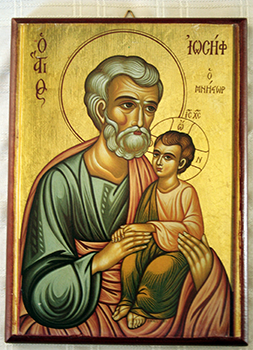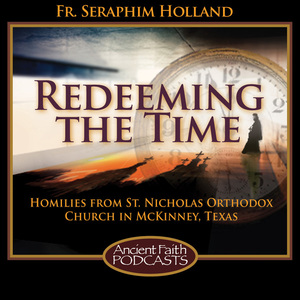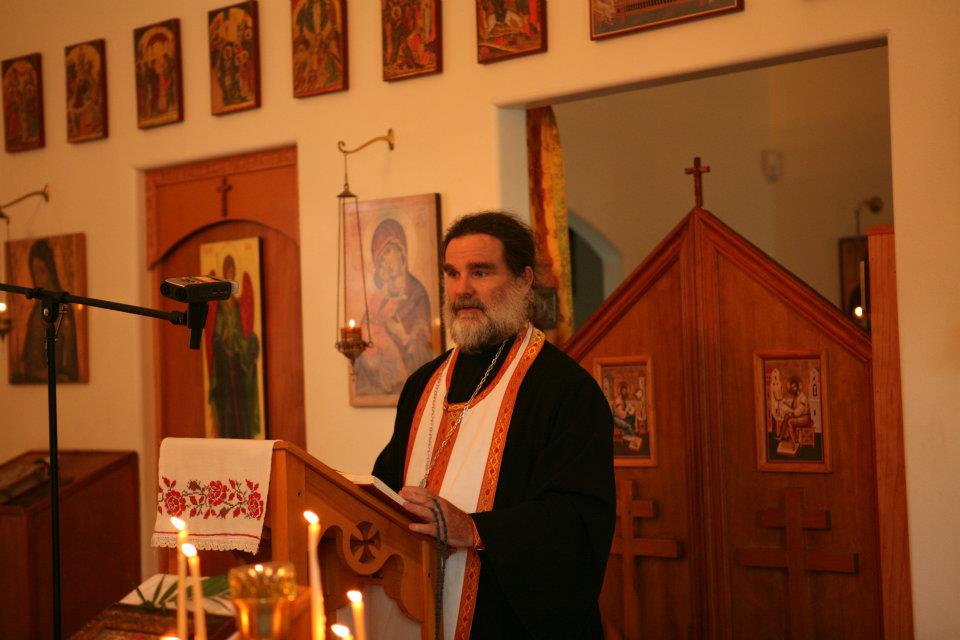Pearls from the Feast of the Nativity, Matins canon
Stories about Prophet David, Joseph the Betrothed, and James the Brother of the Lord
Sunday After Nativity, 2016
The Canon sung at Matins on the Nativity of the Savior has such beautiful theology in it, that I decided to discuss a few of the stichera and given an exegesis of them. After this, some stories about the Prophet and King David, Joseph the Betrothed, and James, the Brother of the Lord, who are always remembered on the Sunday after Nativity.
This AUDIO homily is here:

Joseph the Betrothed with Christ
The following are excerpts from the Canon sung on the Nativity of the Savior. Most were discussed in the homily.
That which, though fashioned in the image of God, is become wholly corrupt through transgression, having fallen away from the higher divine life, hath the wise Creator restored, for He is glorified.
Seeing man, whom He had fashioned with His own hands, perishing, the Creator, descendeth, bowing down the heavens; and, truly incarnate, He taketh upon Himself all manÆs essence through the pure and divine Virgin, for He is glorified.
Christ God, being the wisdom, Word, Power, Effulgence and Son of the Father, hiding Himself as much from the powers of heaven as from those on earth, hath restored us, becoming man, for He is glorified.
Nativity, matins, 1st Ode, 1st canon
Thy sacred womb, which was depicted by the bush which burned without being consumed, manifestly bore the Word and mingled God with a human image, loosing the wretched womb of Eve from the bitter curse of old. Let us glorify Him, O ye mortals!
To the magi the star manifestly showed Thee forth, the Word Who hath existed before the sun and came to bring an end to sin, and Who in Thy mercy wast wrapped in swaddling bands in the wretched cave. And, rejoicing, they beheld the Lord Himself, a man.
ODE 1, 2nd canon
O Lord Christ, Who, mingling with clay, madest Thyself conformable thereto, imparting Thy divine essence by participating in vile flesh, becoming earthly, yet remaining God, and Who hast lifted up our horn: holy art Thou!
Ode 3, 1st canon
In His loving-kindness, He Who reigneth over the heights of heaven becometh like us through the unwedded Maiden; the Word Who before was immaterial later took upon Himself the matter of the flesh, that He might draw to Himself the first-created man, who had fallen.
Ode 3, 2nd canon
Submitting to be recorded among Thy servants at the command of Cµsar, Thou hast freed us slaves from the enemy and sin, O Christ; and having abased Thyself for us, Thou hast made our clay divine through Thy union and sharing therein.
Ode 5, 1st canon
Irmos: Come, O Christ, grant cleansing unto us who out of the gloomy night of the works of deception now keep vigil in hymns as to our Benefactor, and bestowing upon us the easy path, treading which we may find glory.
The following stichera were not talked about in the homily.
By His coming in the flesh the Master hath again cut down the cruel enmity directed against us, that He might destroy the soul-destroying ruler, uniting the world with the immaterial beings, making the Begetter accessible to creation.
Ode 5, 2nd canon
Christ our God, Whom the Father begat before the morning star, is come forth, incarnate, from the womb. He Who ruleth over the all-pure powers lieth in a manger of dumb beasts and is wrapped in swaddling-bands; and he looseth the knotted bonds of transgressions.
Ode 6, 1st canon
God the Word, Who from the beginning was with God, intending to preserve the nature which He Himself shareth with us, now strengtheneth it, which from of old was weak, by another fellowship with it, straightway showing it to be free from the passions.
Nativity, matins, 6th Ode, 2nd canon
O Christ our Helper, using Thine ineffable incarnation as a bulwark of defense, having taken on form, Thou hast put to shame the adversary of men, bearing the richness of Thy deification, in hope of which we had fallen from the heights down into the darkness of the uttermost depths.
Omnipotently Thou hast cast down sin, which is exalted in evil without restraint and is incited to a vile frenzy by the perversion of the world; and those whom it formerly attracted Thou savest from its snares today, having become incarnate of Thine own will, O Benefactor.
Ode 7, 2nd canon
Thou comest, O Restoration of the nations, to bring lost human nature back from the hills of the wilderness to the pasture rife with flowers, that Thou mightest put down the violent power of the slayer of men, having, in Thy forethought, become God as well as man.
ODE 8, 2nd canon
Priest Seraphim Holland 2016áááá
This homily is at:
Redeeming the Time
Homilies from St. Nicholas Orthodox Church in McKinney, Texas
Priestá Seraphim Holland shares his homilies from St. Nicholas Orthodox Church in McKinney, Texas. ôSee then that ye walk circumspectly, not as fools, but as wise, redeeming the time, because the days are evil.ö Eph 5:15-16
Start date: October 2014
Homilies on the Gospels, Epistles, Feast Days, Various topics.
Most homilies given at St Nicholas, McKinney TX
Over 800 Homilies, continuously updated.
LOTS MORE sermons on the Nativity at:
https://www.orthodox.net//sermons/index.html#FEASTS_OF_THE_SAVIOR,_NATIVITY
This and other Orthodox materials are available in from:
St. Nicholas Orthodox Church, McKinney, Texas
+ Mailing Address: Box 37, McKinney, TX 75070
+ Phone/Text: 972/658-5433
+ Email: seraphim@orthodox.net
+ Web Page: https://www.orthodox.net/
Archive of homilies: https://www.orthodox.net//sermons
To receive regular mailings of sermons, and scriptural and services commentary and other things throughout the church year, read our blog ôRedeeming the Timeö (https://www.orthodox.net//redeemingthetime). You may also subscribe to the RSS Feed or receive its postings by email.
Our parish Email list (http://groups.google.com/group/saint-nicholas-orthodox-church) also has all the latest postings from our website and blog; everyone is welcome to join.
All rights reserved.á Please use this material in any edifying reason. We ask that you contact St. Nicholas if you wish to distribute it in any way.á We grant permission to post this text, if completely intact only, including this paragraph and the URL of the text, to any electronic mailing list, church bulletin, web page or blog.

